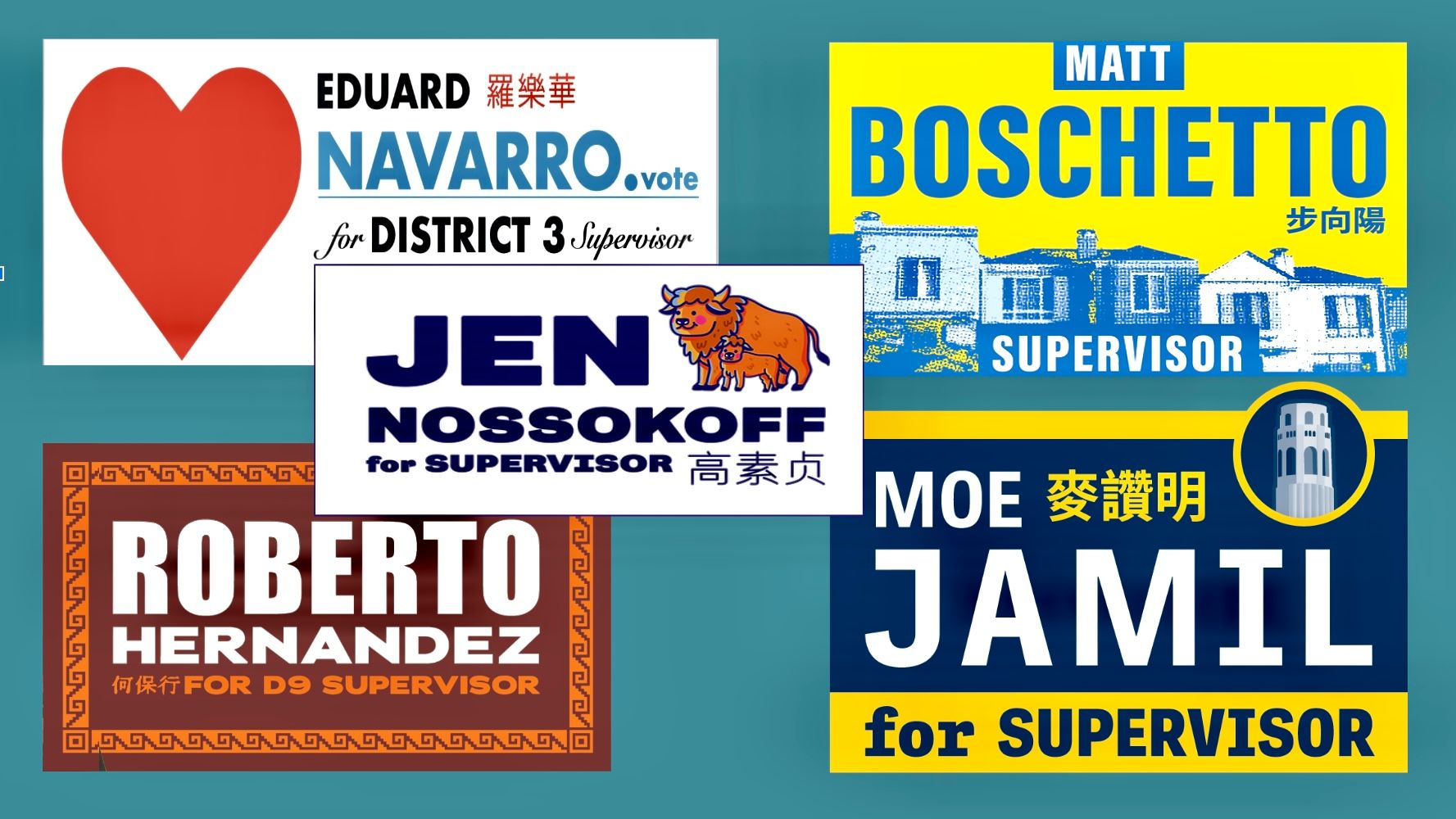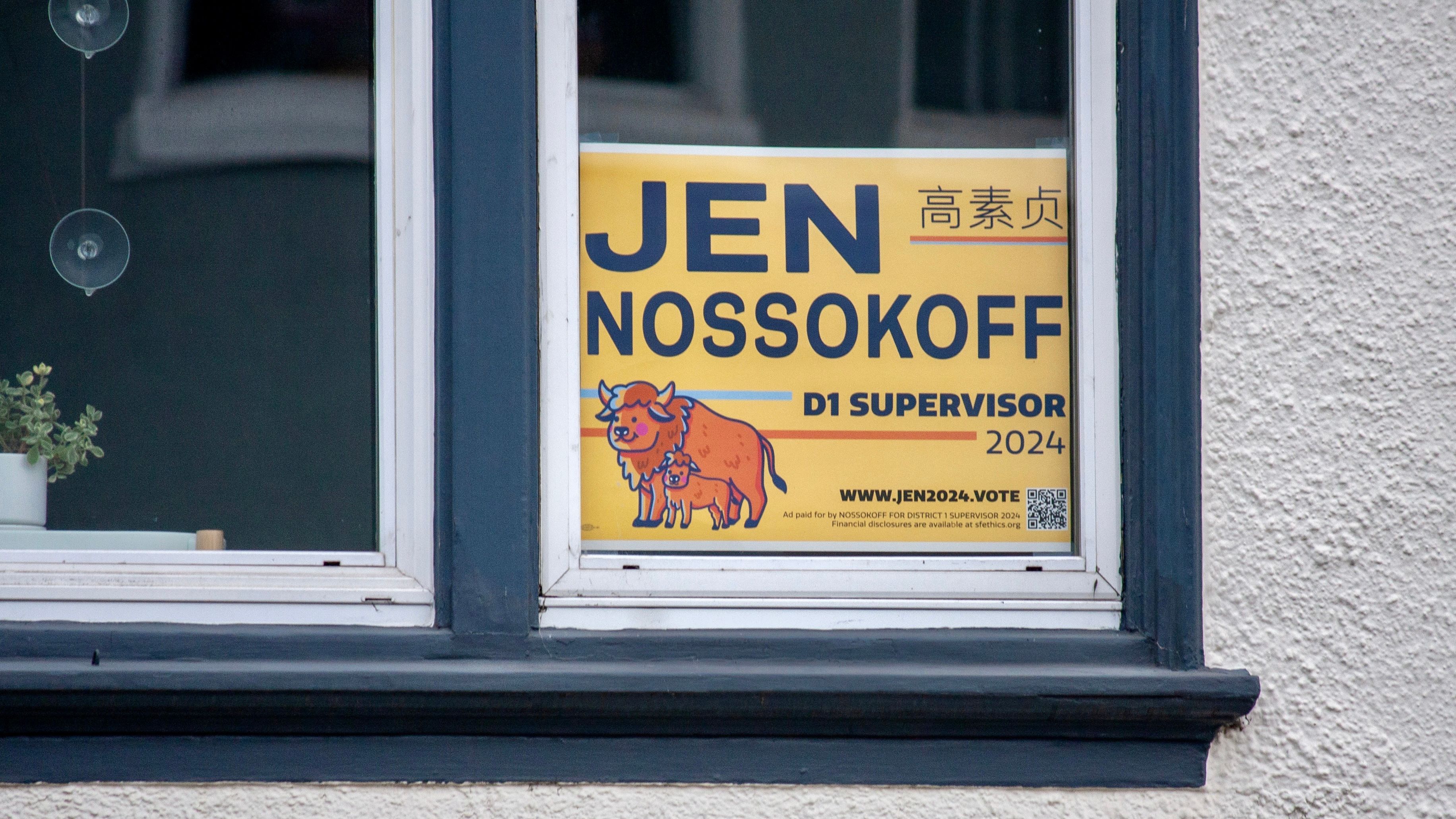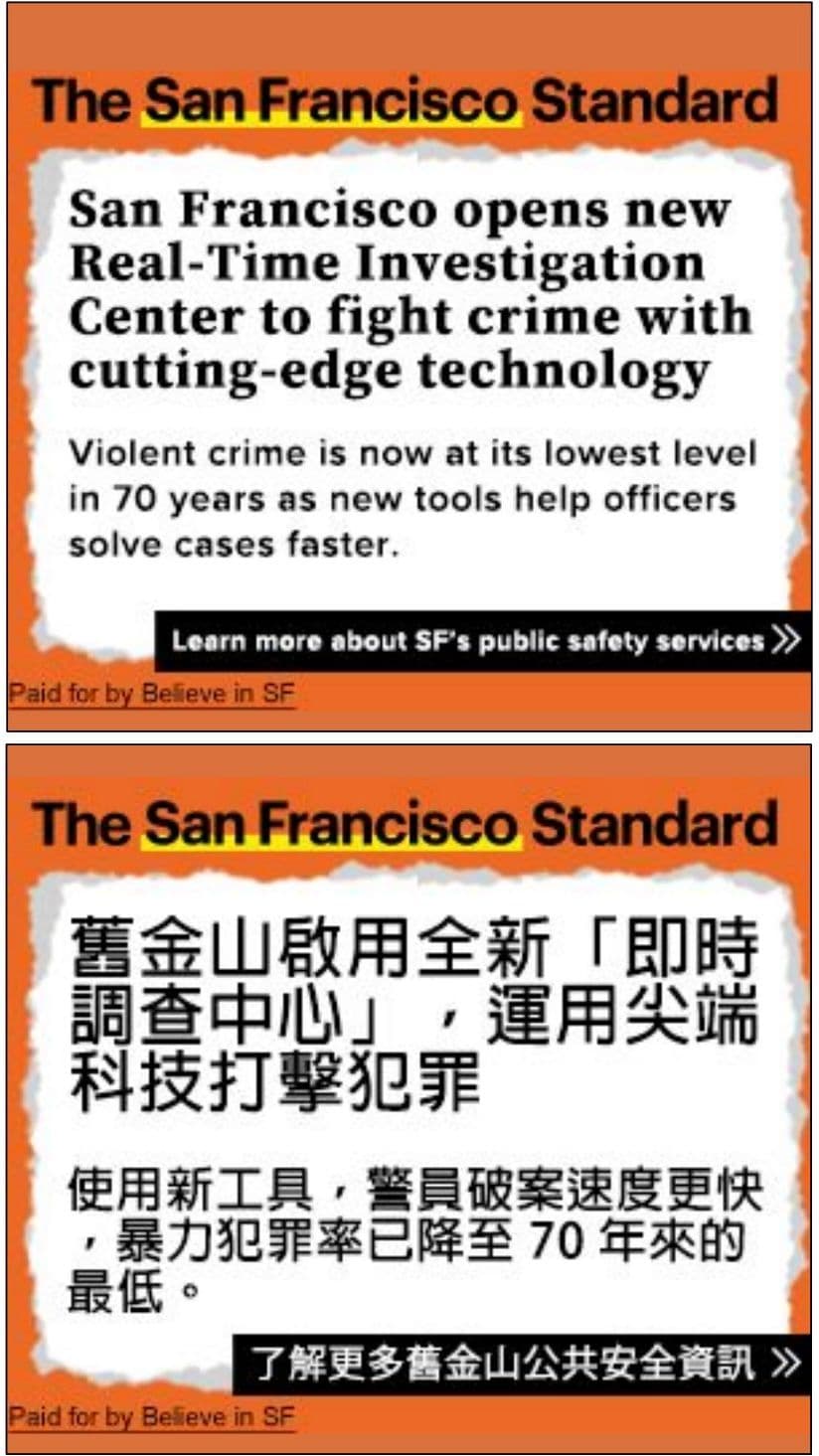Newly-implemented candidate Chinese name law AB 57 creates discrepancy and confusion to both candidates and voters in San Francisco


(SAN FRANCISCO) A newly-implemented candidate name law, AB 57, starting in 2024 in San Francisco has created discrepancy and confusion to both candidates and voters. It might end up affecting the results of the upcoming November election.
The nomination period for candidates running for mayor and supervisors in San Francisco in the November election ended on June 11. A number of Chinese-character-based names submitted by non-Chinese supervisor candidates for putting on the ballot were rejected and replaced by the Department of Elections with Chinese transliterated names.
There are 10 days until June 24, 2024 for the public and candidates to review or challenge their names and other information on the ballot.
District 1 (D1) Supervisor candidate Jen Nossokoff, District 3 (D3) Supervisor candidates Moe Jamil and Eduard Navarro indicated that they would challenge the decision made by the Department of Elections. District 7 (D7) Supervisor candidate Matt Boschetto and District 9 (D9) Supervisor candidate Roberto Hernandez said they were disappointed and would not challenge the decision, but would continue to keep their unique Chinese names during the campaign.
This practice is new in San Francisco in 2024 based on a 2020-enacted election law which requires candidates, who submit their Chinese-character-based names for ballots, to provide evidence that those names have been used for at least two years.
The new policy has been called an unfair practice by first-time candidates who were/are running for public offices in the March primary and the upcoming November elections. The candidates were rejected for using the Chinese-character-based names that they submitted for the ballots. Instead the Department of Elections provided the candidates with different Chinese names based on transliterations.
First-time candidates have complained that the new implementation of AB 57 in San Francisco has provided an extra advantage for incumbent candidates who could continue to use their formal Chinese-character-based names which are much easier for Chinese American voters to remember.
First-time candidates also believe that they should be allowed to share the same rights as many other candidates to put their own Chinese names on the ballots for voters.
San Francisco's newly-enacted Chinese name election law was the implementation of State Law AB 57 which was authored by Assemblymember Evan Low, D-Silicon Valley, in 2019. AB 57 was in effect on new year day in 2020 and created a 2-year requirement of proof for putting Chinese-character-based names on the Chinese-language ballots, otherwise the candidates' Chinese names must be transliterated. The law is also applied to other languages.
The San Francisco Department of Elections did not strictly follow AB 57 until the Board of Supervisors voted 10-1 on October 31, 2023 to pass a resolution proposed by Supervisor Connie Chan. The resolution urged the Elections Department to implement AB 57. "Cultural appropriation does not make someone Asian," Chan told the news media during the time that she proposed the resolution at the Board of Supervisors.
District 5 Supervisor Dean Preston excused himself from voting on the resolution which was immediately enacted on November 10, 2023.
In the City's Elections Commission monthly meeting on April 17, 2024, an amendment was proposed to allow candidates, who were given a Chinese-character-based name at birth and could not provide documentary evidence for using the name for over two years, to submit declarations signed by family members or candidates themselves as proof.
However, except the native born Chinese American candidates, almost all non-Chinese candidates did not qualify for the amendment by having their Chinese-character-based names at birth. AB 57 and the resolution proposed by Chan have generated discrepancy between candidates.
"I don't understand English at all. But I have voted on the Chinese-language ballots for many years since I have been eligible to do so,” said Han Chang Su, 87, a Visitacion Valley community leader for decades.
“A name represents an identity. Candidates' Chinese-character-based names which carry their own meanings are very significant to me and all monolingual Chinese speaking voters, because those names are much easier for us to remember and recognize,” Su continued. “The transliterated-based Chinese names are always similar to each other. We might make mistakes by voting for the wrong candidates on the ballots."
Su urged the City to allow as many as candidates to choose their own Chinese names on the Chinese-language ballot. "The more the better for us to recognize the candidates," Su confirmed that he would not vote for any candidates only based on their Chinese names.
A total of 13 candidates are listed qualified for the mayoral race, while 34 candidates are qualified for 6 supervisor seats when the nomination period ended on June 11.
However, a number of first-time running and non-Chinese supervisor candidates were rejected by the Department of Elections for putting their own Chinese names on the ballot. Instead, the Elections Department provided them with different Chinese names based on transliterations.
D1 Supervisor candidate Jen Nossokoff
D1 Supervisor candidate Jen Nossokoff submitted her Chinese-character-based name, 高素貞, which was rejected on June 12. She was renamed as 珍 ‧ 諾索科夫 in Chinese by the Department of Elections.
Nossokoff did not meet the 2-year requirement and has fought for using her own Chinese-character-based name on the ballot for months including attending the Elections Commission monthly meeting in person on April 17, 2024.
Nossokoff told Wind Newspaper that she was in the process of challenging the decision made by the Department of Elections. She was disappointed that the Elections Commission did not take action on her complaint although the commission has been well aware of the inequality on the Chinese name issue.
"Additionally, I have filed a complaint with the California Secretary of State due to significant legal and ethical concerns," Nossokoff said. "This is a matter that deeply concerns my campaign and the Chinese community here in San Francisco."
"The mid-cycle enforcement of this change, initiated by Supervisor Chan, my primary opponent, leverages a five-year-old state law that had never before been applied to San Francisco, a charter city," Nossokoff added.
"Her (Chan) actions to invoke this law only during an active election cycle, where she stands to benefit, underscores a severe conflict of interest and a manipulation of electoral guidelines for personal gain," Nossokoff further said. "This raises fundamental questions about the integrity of our election process and the impartial application of laws, highlighting a misuse of official position and an apparent disregard for established electoral fairness."
Nossokoff was the first candidate to file a declaration of candidacy on July 12, 2023 among five candidates in the D1 supervisor race. "To clarify, I have not used this Chinese name for more than two years. It was given to me by a member of our local Chinese community when I filed to run, upon learning that the Department of Elections requires a Chinese name but provides neither a name nor guidance. I followed the precedent set by other non-Chinese candidates over the last decade, acting intentionally with respect and in good faith," Nossokoff affirmed her commitment to serving the Chinese community in Richmond District which is one of the largest Asian neighborhoods in San Francisco and against the allegation of "cultural appropriation".
"As a first-time candidate operating with limited resources, changing my Chinese name now is not financially or operationally feasible. We have many campaign signs already placed in windows throughout the district, making a change at this point impractical," Nossokoff said she would keep her own Chinese name for her campaign. "It's crucial that voters understand not just the names, but the stories and the values behind them."
Chan is one of the five candidates in the D1 Supervisor race running for reelection in November. "The Department of Elections is simply following a law that was authored by Assemblymember Evan Low and enacted by the State Legislature in 2019 - long before Supervisor Chan held office," said Julie Edwards, spokesperson for Chan's re-election campaign.
D3 Supervisor candidate Moe Jamil
D3 Supervisor candidate Moe Jamil submitted his Chinese name, 麥讚明, to the Department of Elections and was rejected. His Chinese name was replaced with a similar name having a dot between the Chinese characters as 麥 ‧ 讚明.
Jamil is not of Chinese descent, but speaks very fluent Cantonese after studying a year at the Chinese University of Hong Kong when he was an exchange student at UC Berkeley.
Beyond that, Jamil's wife is the daughter of Chinese immigrants from Taiwan. Prior to filing a declaration of candidacy on August 24, 2023, Jamil decided to make his formal Chinese name as 麥讚明 which was named by a group of his family members.
Jamil's Chinese name was based on the pronunciation of his English name. It was also transliterated. Jamil said he and his family chose all three Chinese characters as his name that could be the best match. There was no advantage in the meaning of his Chinese name trying to gain more votes.
Since he entered the race, Jamil has directly communicated with Cantonese-speaking voters by introducing himself with his Chinese name. His name has been on campaign materials, at events and in the Chinese language press.
Jamil challenged and requested to remove the dot added by the department. He told Wind Newspaper that his request was denied with a response that the dot would be used for transliteration of his English name.

"Since they accepted my Chinese characters, it will be futile to fight with them. I don't intend to change our signs at this point as it will just confuse voters more," said Jamil. "The Department of Elections' process favors career politicians whose names were certified in previous cycles and hurts political newcomers like me."
D3 Supervisor candidate Eduard Navarro
D3 Supervisor candidate Eduard Navarro was born in Spain and grew up on the East Coast. He has lived and worked all over the globe in different countries until 2 years ago moved to San Francisco as a tech startup founder.
Navarro speaks 5 languages, Spanish, French, German, Valencian (Catalan) and English. He has lived at an apartment nearby Chinatown since he moved to San Francisco and walks by Chinatown almost everyday. He studied architecture at Georgia Institute of Technology with a bachelor's degree and at Columbia University with a master's degree.
Navarro remembered when he studied at Columbia University in New York almost 20 years ago, 40% of his classmates were Asians. He still keeps in touch with his longtime classmate who resides in Hong Kong.
When he made up his mind to run for D3 Supervisor to contribute his expertise in urban design and finance, he wanted to have his own Chinese-character-based name in respect of Chinese culture.
Navarro’s Chinese American friend in the tech industry in the Bay Area and his former classmate in Hong Kong worked together to name him as 羅樂華.
"My Chinese name was also transliterated from my English last name with a special meaning," Navarro said he was disappointed to see his own Chinese name being rejected by the Department of Elections.
Navarro's Chinese name on the ballot would be replaced by transliteration as 愛德華 ‧ 納瓦羅. He felt that the City had taken away his equal right to present his formal Chinese name to the Chinese American voters who would be easier to recognize and remember his Chinese-character-based name on the ballot.
"I am running for a Supervisor seat representing Chinatown. I need to have my own Chinese name. I shouldn't be named by the Department of Elections," said Navarro. "I love my Chinese name. It belongs to me. I will keep using it during my campaign."
Navarro said his English name would still be on the Chinese language ballot. He hoped that Chinese voters would be able to vote for him on the Chinese-language ballot. "The latest move to implement AB 57 has created so much confusion to candidates and voters as well," Navarro added.
D7 Supervisor candidate Matt Boschetto
D7 Supervisor candidate Matt Boschetto is a 4th generation San Franciscan whose family roots began in 1912. He is a small business owner and also a victim of crime when thieves broke into his home and stole irreplaceable family heirlooms. He decided to do something to stop crimes and filed his declaration of candidacy on July 7, 2023. Public safety is his top priority among many issues.
When Boschetto decided to run for supervisor in 2023, many people helped him develop his Chinese-character-based name 步向陽. The Department of Elections rejected his name and replaced it with 馬修 ‧ 博施基托.
Boschetto printed his campaign materials with his own Chinese name within the past year, not over two years to meet the requirement. He decided not to challenge his Chinese name on the ballot at this point.
"I will just move forward with my transliterated name. My concerns were more around the fact that I had already invested in that name, and simply was asking for clarity around the language of the law and whether my name would be compliant or not," said Boschetto.
Boschetto questioned why the Department of Elections did not make a ruling on names earlier to minimize the impact to candidates and voters if the City would implement AB 57.
"My campaign has printed signs and other materials because we wanted to get an early start reaching out to voters. District 7 is under-represented at City Hall and this further gives an advantage to the incumbent, who is out of step with our District’s voters on important issues," Boschetto said.
"My campaign knows the importance of having one-on-one conversations with residents and listening to their concerns — not just contacting them a few weeks before the election to ask for their votes," Boschetto added.
Although his own Chinese name would be replaced on the ballot, Boschetto will keep the name. "I have a strong relationship with Chinese community leaders, and multiple people helped me develop my name," Boschetto said. "While it may not appear on the ballot, I still feel incredibly honored to have a name that was developed from the community and one that has a special meaning unique to me."
D9 Supervisor candidate Roberto Hernandez
D9 Supervisor candidate Roberto Hernandez submitted his Chinese-character-based name 何保行 to the Department of Elections and was rejected. His Chinese name on the November ballot would be replaced with 羅伯托 ‧ 赫南德斯 by the department based on the transliteration of his English name.
Hernandez is a 2nd generation San Franciscan growing up in the Mission District and has become a community leader for decades.
His Chinese name 何保行 came from the Chinese community leaders in the Portola neighborhood which is one of the largest Asian neighborhoods in the city and in D9.
"That name, 何保行, was presented to me on behalf of these community members over coffee and tea in early 2023," said Hernandez.
"After many years of working with immigrant seniors in my district, specifically for our elderly Asian and Latino residents, Chinese community leaders from the Portola neighborhood shared that they had a name they referred to me by, which includes characters that sound similar to my name in English and Spanish, with a meaning that reflects the work around public safety and food security we’ve been doing together," Hernandez recalled.
"I provided three articles going back over a year in which I was referred by 何保行, but I do not have a record of being referred to by this name publicly going back two years," Hernandez said he knew that he has not used his own Chinese name for over two years, so he did not plan to challenge the City's newly-implemented Chinese name policy.
"While I wish that the Department of Elections had provided us with a transliterated Chinese name much earlier, I did print signs and literature with the name that many Chinese-Americans know me by, which is 何保行," Hernandez said.
"However, given that the Department of Elections guidance suggests that candidates need to have established use of their Chinese name 'during the past two years' and not 'for the entire duration of the past two years', I do believe that my established use of 何保行 shouldn’t prohibit me from listing it on the ballot," Hernandez added.
Although Hernandez did not plan to spend the time and resources challenging the discrepancy, he wanted to voice the concerns of AB 57 and the City's implementation of the law. "I hope that
the DOE recognizes that refusing to let me and other candidates use their established Chinese
names is not in alignment with the official guidance that has been issued," said Hernandez.
"Ultimately, San Francisco has much more urgent issues to address, and I prefer to direct my energy toward serving my district." Hernandez thanked the support from the Chinese community and said, "I'm honored to have received this name from the community. While my supporters are disappointed that the name they gave me is unlikely to appear on the ballot, I’m looking forward to continued collaborations with the Chinese community across District 9."
Assemblymember Evan Low did not immediately respond to a request for comment by press time on AB 57 that he authored in 2019.
“If candidates can provide documentation they have used the name in the public sphere for two years prior to their filing nomination documents, then we can include the name on the ballot,” said John Arntz, Director of the city's Department of Elections.
- If someone’s vehicle blocks your driveway, San Francisco's 311 service will resolve it easier and safer for you
- U.S. Department of Homeland Security proposes green card status can be denied for Medicaid and SNAP recipients
- NAPCA Column 18: About the One Big Beautiful Bill Act
- San Francisco Real-Time Investigation Center (RTIC) equipped with drones and advanced technologies now fully operates to help keep the city safe
- The community blessed for two Chinese American Police Chiefs in a row to lead San Francisco Police Department
- San Francisco newly-appointed D4 Supervisor Alan Wong votes for Family Zoning Plan in his first full board meeting
- Opinion: My concerns about negative impact of road constructions to traffic and communities in SF’s Chinatown and Sunset
- Tech entrepreneur & political advisor Saikat Chakrabarti runs for Congress to fill Nancy Pelosi’s House seat






